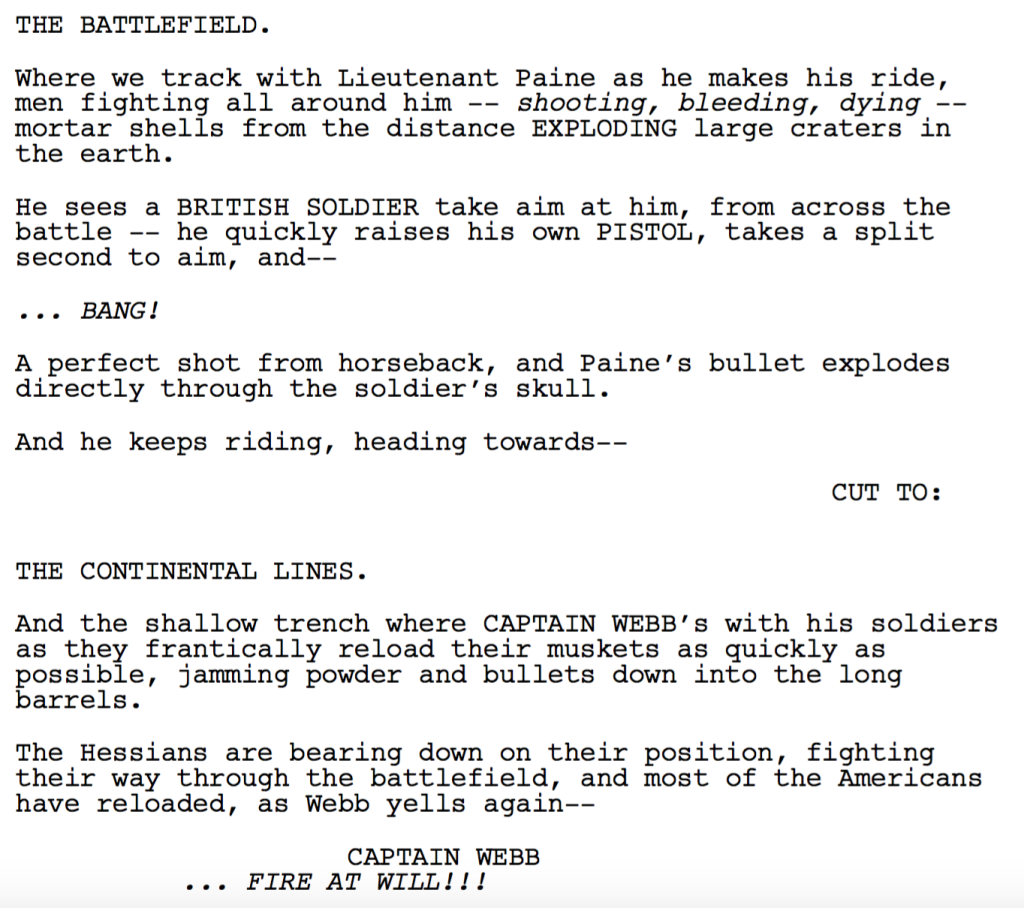Genre: Period/Action/War
Premise: Based on a true story, a young woman enlists in the Revolutionary War in a bid to help America win independence.
About: Today’s script was one of the big spec sales from 2016, fetching nearly seven figures due to an intense bidding war that Amy Pascal and Sony ended up winning. 33 year-old Christopher Cosmos ends up being one of the lucky first-time screenwriters to nab a big sale. The project is currently in development. But with its girl-power slant, it’s only a matter of time before the film gets made.
Writer: Christopher Cosmos
Details: 116 pages
Hollywood is in this new era where messages and agendas are becoming almost as important as the bottom line. Even when you’re promoting a more inclusive system, there are always people pointing out you’re not inclusive enough.
Take this weekend’s Mama Mia sequel, a film that is built around and stars multiple women. That should be championed, right? Not exactly according to some. Twitterverse couldn’t help but take shots at how the entire cast is as white as the inside of a coconut.
Don’t think for a second that the studios aren’t discussing these issues. And while they probably realize you can’t win over everyone, they’re going to try. Which is why any female-driven project is shooting to the top of the script pile these days.
I don’t care what a script is promoting or even what the subject matter is AS LONG AS IT’S GOOD. If you’ve got a great script to back up whatever you’re selling, I’m 100% with you. Let’s see if today’s script delivers.
20-something William Jaffers is living a nightmare. The trench he’s in is so filled with dead bodies that he has no choice but to stand on them while shooting at the approaching redcoats. When the British make a run at the Americans, William has no choice but to retreat.
While doing so, he watches two teenage brothers, James and Andrew Thomas, get shot. While dying, James makes William promise to deliver a letter he wrote to his parents. William survives the retreat and delivers the letter and devastating news to the Thomas family, and while there, takes note of a young maid named Deborah.
After William leaves, something comes alive in Deborah resulting in her wanting to join the war. The only problem is, it’s illegal for women to fight in the army. So Deborah has to sneak away, dress like a man, and join under false pretenses.
Ironically, after she joins, she’s assigned to be the assistant to a captain, which basically means she’s performing the same duties she did as a maid.
Deborah says “screw this,” and sneaks away to fight a mission to secure a bridge. Coincidentally, William is leading that mission. He notices something familiar in this new recruit, but doesn’t think much of it. Deborah performs heroically on the mission, helping obtain key British intelligence, which should help the Continental Army catch Lord Cornwallis, the leader of the British Forces.
Unfortunately, while prepping for the final battle, William discovers Deborah’s secret. Will Deborah be sent back to doing household chores? Or will William and the rest of the army realize they have one of the fiercest soldiers in the army – man OR woman – at their disposal?
American Rebel has one hell of an opening scene.
I’m talking Saving Private Ryan worthy. The way Cosmos describes the chaos of this battle placed me right in the thick of it.
But it’s not just the description of the battle. For these things to work, you have to introduce us to a character – in this case, William – and immediately make us like him so that we’re WORRIED for him. Without that emotional attachment, the words describing the battle mean nothing. They’re glorified description porn.
And this is something I alluded to yesterday. Stories don’t work unless we’re attached to the characters on an emotional level. Whatever approach or device you need to use to achieve that, do it. Cause if you think you can plop names down on the page and we’re going to give a shit, you can take your place in the Never Sell A Script Line.
Here’s the problem with American Rebel, though. It does a better job making us care about William than it does about Deborah. As a result, the script never quite works when it shifts to Deborah’s struggle. Because we always feel like even though this movie is about her, William is the guy who pulled us in.
To be honest, I’m not even sure why Deborah wanted to join the army. Two seconds after we meet her, William shows up to deliver the news about the dead sons. And, all of a sudden, Deborah’s determined to be G.I. Jane.
What were Deborah’s feelings about the war? What are her feelings about the British? What are her feelings about ANYTHING?? We don’t know. And therefore we’re kinda confused why she all of a sudden wants to fight. It would’ve made a lot more sense, for example, if she was the mother of these boys who were killed. Or the sister. But no. She’s just some random maid.
One scene could’ve solved this. Before William showed up, we could’ve had a dinner scene with the father and maybe some other men from town, and they’re all sharing their thoughts on the war and what’s going to happen, and Deborah, who’s serving them, can’t resist after a certain point, and interjects with her very opinionated take. Just one moment like that would tell us how passionate she was about this topic.
The rest of the script is a mixed bag. Cosmos is really good at describing action as well as delivering the occasional surprise. Things would happen in this script where I’d go, “Holy shit! I didn’t expect that to happen.” I always like being kept off-balance in a read. If I get too comfortable, it means I’m ahead of the writer. And Cosmos was always knocking me off my assumption perch.
But a lot of that was undermined by the handling of Deborah. I was never clear on what Cosmos was trying to do with the character. For example, Deborah’s secret is exposed three separate times, and there were zero consequences to any of it. The other character was slightly shocked, but ultimately shrugged their shoulders and said, “Who cares?”
So if nobody cared, why disguise yourself in the first place? This may sound nit-picky but if you’re going to build your story around the need to be disguised, then there needs to be consequences if that disguise is discovered. And there wasn’t. At the end of the script, I found myself pondering whether anything in the movie would’ve been different had Deborah been a male character.
Despite those issues, Cosmos did a really nice job with the historical details and the set-pieces here. I cared whether these characters were able to win this war and I was mostly looking forward to each sequence. For that reason, I give this script a worth-the-read.
[ ] What the hell did I just read?
[ ] wasn’t for me
[x] worth the read
[ ] impressive
[ ] genius
What I learned: Why does your hero want to go on their journey?? I’m amazed that writers overlook this question. Most of the time, the reason will be built into the premise. If there’s a serial killer and your hero is the detective assigned to the case, we don’t ever ask why he’s on this journey. He has to be. It’s his job! But for movies where that isn’t as clear, you, as the writer, need to make it clear. Or else we’re wondering the whole time why your character is even bothering. And in Cosmos’s defense, there is a scene at the end of the movie where Deborah’s asked this question and gives an answer. But it’s too little too late. We need to know that answer AT THE OUTSET. Or else we’re going to be confused the whole time.
What I learned 2: This is a good example of if you write a script in one of the 2 or 3 categories Hollywood is looking for at that moment, they’re willing to overlook weaknesses in the script.



